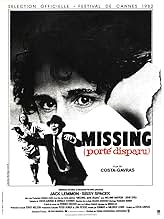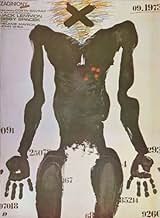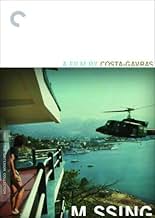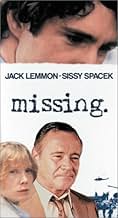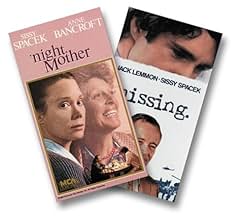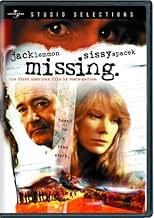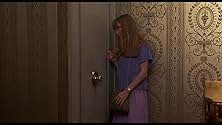Quando um idealista escritor americano desaparece durante o golpe de estado chileno em setembro de 1973, sua esposa e seu pai tentam encontrá-lo.Quando um idealista escritor americano desaparece durante o golpe de estado chileno em setembro de 1973, sua esposa e seu pai tentam encontrá-lo.Quando um idealista escritor americano desaparece durante o golpe de estado chileno em setembro de 1973, sua esposa e seu pai tentam encontrá-lo.
- Direção
- Roteiristas
- Artistas
- Ganhou 1 Oscar
- 12 vitórias e 23 indicações no total
- Paris
- (as Martin Lasalle)
Avaliações em destaque
Directed by Costa-Gavras, Missing is a film that seems to care more about informing the world of this gross injustice, rather than do anything particularly entertaining for it's audience. Opening with the statement that the events of the film are true and left unchanged, there is certainly an air of importance added to their search, always leaving the audience aware of the real life consequences of this crime. It's a condemnation of government and negligence, much like Gavras' earlier film Z, but it's much more about the emotional conflict of Ed Horman than it is about trying to thrill it's audience.
Beth and Charlie were idealists, some could even say radical liberals, but Ed was a very conservative man who shunned their attacks on the government. He was a man who believed in what his nation stood for and through the beginning of the film he is constantly giving them the benefit of the doubt, trusting that they are not being lied to. The brilliant evolution that occurs in this film is in the way that Ed slowly comes around more to Beth's way of thinking; they start off on opposite sides but gradually come together as he begins to form a distrust in the U.S. government in Chile and a rage inside of him grows.
Lemmon's performance stands among his best, slowly developing a more angered and combative streak in Horman, but never losing sight of the fact that this is ultimately just a man who wants his son back. There's a scene late in the film where he is pleading for his son, practically on his hands and knees, not caring if he is dead or alive he just wants his son so he can return home, that is absolutely devastating. Lemmon and Gavras succeed admirably in bringing this heartbreaking story to the public eye, made even more wrenching when the final truth is revealed (or even more so if you read up on the events that occurred after the film was released).
***1/2 (out of four)
Govras chose as background for his film the actual diaries of Charles Horman, a lefty artist type who was living with his wife Beth in Chile. Horman had apparently picked up the unfortunate habit of inquiring into some dangerous affairs in a rather loud way. Isolated in every sense from any "live" political current, his disappearance and murder were relatively easy to accomplish, even though he was a United States citizen. The actor John Shea portrays Charles Horman as a naive sort, and there is no reason to assume this was an inaccurate depiction. Most citizens of the United States overseas are sheltered from the skulduggery of realpolitik, and most cling to some rather dangerous illusions about how far their rights as citizens actually extend. U.S. citizens in Lebanon who had to pay for their removal from that combat front last summer have learned this the hard way recently.
Jack Lemmon is stellar as Charles' father Ed Horman, who made the trip to Chile under the impression that he had rights his government felt bound to respect, and who discovered otherwise. And Cissy Spacek is never anything less than full marks as Beth Horman.
MISSING accomplishes what few political dramas do. It asks its viewer to consider the human dimensions and costs of an imperial political reality, and it portrays with a deadly earnestness what these ideas do to people caught up in the sway of such notions. There are no monsters in MISSING, just people who are doing their jobs and following orders. And therein lies the horror, one which all too many of our fellow citizens have yet to come to grips with. It is a rare feat among political films, an actual work of art. But don't be surprised if you need a stiff drink after viewing it. That's how I felt when I first saw this work after its release in 1982, and it still has that effect upon me today.
Você sabia?
- CuriosidadesDuring the Pinochet dictatorship, which ran from 1973 to 1990, this picture was banned in Chile.
- Erros de gravaçãoWhen Ed Horman is at the State Department trying to get information about Charlie, there is the presidential portrait of Richard Nixon on the wall in the background and a more personal photo of him on Marine One on the credenza behind the desk. That photograph, with fingers in the V-peace sign, was taken upon his final departure from the White House in 1974 and could not have been on someone's desk in 1973.
- Citações
Consul Phil Putnam: Please try to understand. There are so many cases. They're all so important, and this isn't the only one we're working on.
Ed Horman: It's the only one I care about.
Consul Phil Putnam: You and a lot of other people. Listen, I've never seen so many cables from Washington. What kind of pull do you have up there anyway?
Ed Horman: I'm an American citizen.
- Trilhas sonorasMy Ding a Ling
(1952)
Written by Chuck Berry (uncredited)
Performed by Chuck Berry
Courtesy of All Platinum Records, Inc.
Principais escolhas
Detalhes
- Data de lançamento
- Países de origem
- Idiomas
- Também conhecido como
- Desaparecido
- Locações de filme
- Acapulco, Guerrero, México(as Vina del Mar)
- Empresas de produção
- Consulte mais créditos da empresa na IMDbPro
Bilheteria
- Orçamento
- US$ 9.500.000 (estimativa)
- Faturamento bruto nos EUA e Canadá
- US$ 14.000.000
- Faturamento bruto mundial
- US$ 14.000.000
- Tempo de duração
- 2 h 2 min(122 min)
- Cor
- Proporção
- 1.85 : 1


